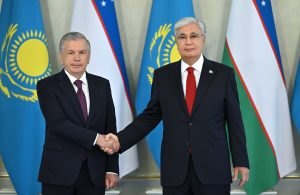A little-known lithium deposit in central Uzbekistan sparked a bidding war not between mining companies, but between foreign governments. Recent geological surveys and exploration in Uzbekistan’s Kuldjuktau and Auminzatau mountain deposits have prioritized the evaluation of critical mineral reserves, positioning the country to strengthen its mining sector, attract strategic foreign investment, and secure a long-term, sustainable supply of essential resources. Recognizing the geopolitical and economic value of these deposits, both Uzbekistan and the United States initiated bilateral cooperation to enhance technical expertise and investment potential. Neighboring Kazakhstan is also seeking to deepen international investment in its own critical mineral reserves.
This exploration underscores a growing policy problem: Kazakhstan and Uzbekistan, both rich in critical minerals such as uranium, lithium, and rare earth elements, are becoming key players in global geopolitics, yet their policy frameworks lag behind this strategic significance, creating vulnerabilities for both regional and global stability.
Kazakhstan and Uzbekistan must reorient their critical minerals policies, moving beyond a strictly national economic lens and embedding them within a comprehensive geopolitical strategy. Their central position in Eurasia places them at the crossroads of Chinese, Russian, and Western interests, which transforms mineral exports into tools of influence. Mineral exports offer Kazakhstan and Uzbekistan a rare opportunity to shift their roles from passive resource providers to active shapers of regional order. Both countries, however, face internal governance gaps and lack long-term regulatory clarity in resource policy, which invites geopolitical manipulation.
The absence of consistent, long-term regulatory frameworks in Kazakhstan and Uzbekistan undermines investor confidence and weakens strategic planning in the mineral sector, limiting their capacity to leverage resources for sustained regional influence. Internal governance challenges such as institutional fragmentation, limited transparency, and uneven enforcement of contracts further erode the effectiveness of resource management. These structural weaknesses create openings for external powers to exploit regulatory ambiguities, influencing domestic policies through conditional investments or preferential agreements.
Critical minerals are indispensable to clean energy and defense technologies. They offer the region an advantage, if wisely managed.
A more robust, multilateral mineral governance structure is essential for protecting national interests and enhancing regional cooperation. Strategic neutrality and transparency should be the pillars of this reorientation. By coordinating mineral policies, investing in local processing, and limiting long-term concessions to any one power bloc (Russia or China), Kazakhstan and Uzbekistan can rebalance existing asymmetries and assert greater control over their future.
Furthermore, regional states should consider a competitive bidding framework backed by international financial institutions to ensure fair access and transparency, while safeguarding sovereignty. This step is necessary to address the monopolization of mineral value chains by China and, increasingly, Russia. Uzbekistan, for example, signed a major lithium development deal with a Chinese firm in 2023, bypassing local environmental review and excluding Western bidders. This model of closed-deal diplomacy sidelines both democratic accountability and long-term economic resilience.
Kazakhstan has demonstrated a similar pattern, where major mineral projects have been agreed through direct negotiations with countries like China and Russia, often without competitive bidding. For example, in 2022 and 2023, Kazakhstan signed several strategic agreements with Chinese companies to develop rare earth and battery-related minerals, including lithium and beryllium, under bilateral frameworks. These deals prioritized political and strategic interests over open competition or strong environmental oversight. Such arrangements have raised concerns among analysts and civil society about transparency, accountability, and ecological impact. Excluding international financial institutions and competitive processes from these agreements limits Kazakhstan’s ability to build a resilient and diversified system for resource governance. Adopting transparent bidding mechanisms aligned with global norms could improve investor trust and support long-term national control over critical mineral assets.
Finally, anti-corruption institutions must be empowered with oversight tools tailored to the extractives sector, and mineral governance should be integrated with broader democratic reforms. In both Kazakhstan and Uzbekistan, strengthening anti-corruption institutions is essential to improve transparency in the extractive industries. These institutions need specific oversight tools like public contract registries, real-time licensing databases, and independent audits of mineral revenues. In Kazakhstan, recent reports have shown that uranium licenses were awarded to politically connected figures without public disclosure, highlighting the need for tighter scrutiny. Uzbekistan has taken initial steps by joining the Extractive Industries Transparency Initiative (EITI), but enforcement remains weak without broader legal and judicial reforms. Reforms are necessary to restore public trust and prevent external actors from exploiting internal divisions.
Some critics argue that Kazakhstan and Uzbekistan should avoid the risk of politicizing their mineral policies by engaging in the efforts explained above and instead focus on simply attracting investment. While economic development is vital, this perspective underestimates the strategic nature of critical minerals in a multipolar world. Critics are right to warn against overregulation or foreign investor flight, but they overlook the risks of geopolitical entrapment. A smart policy approach would balance investor interest with national security and long-term development planning.
Kazakhstan and Uzbekistan stand at a pivotal juncture: they can either allow external powers to dictate the terms of critical mineral extraction, or they can seize the initiative to build sovereign, strategic, and sustainable resource policies. Through regulatory reform, international cooperation, and strategic neutrality, both countries can transform geopolitical vulnerability into geopolitical agency. The time to act is now to avoid confrontation over critical minerals and build cooperation for a better future.
































